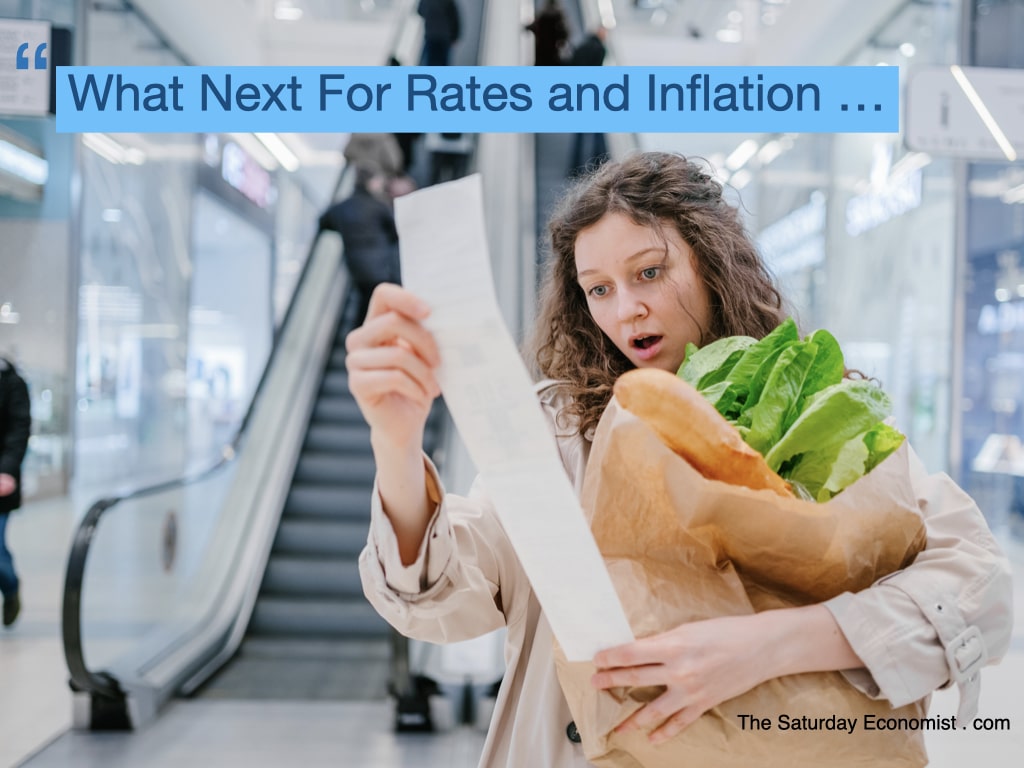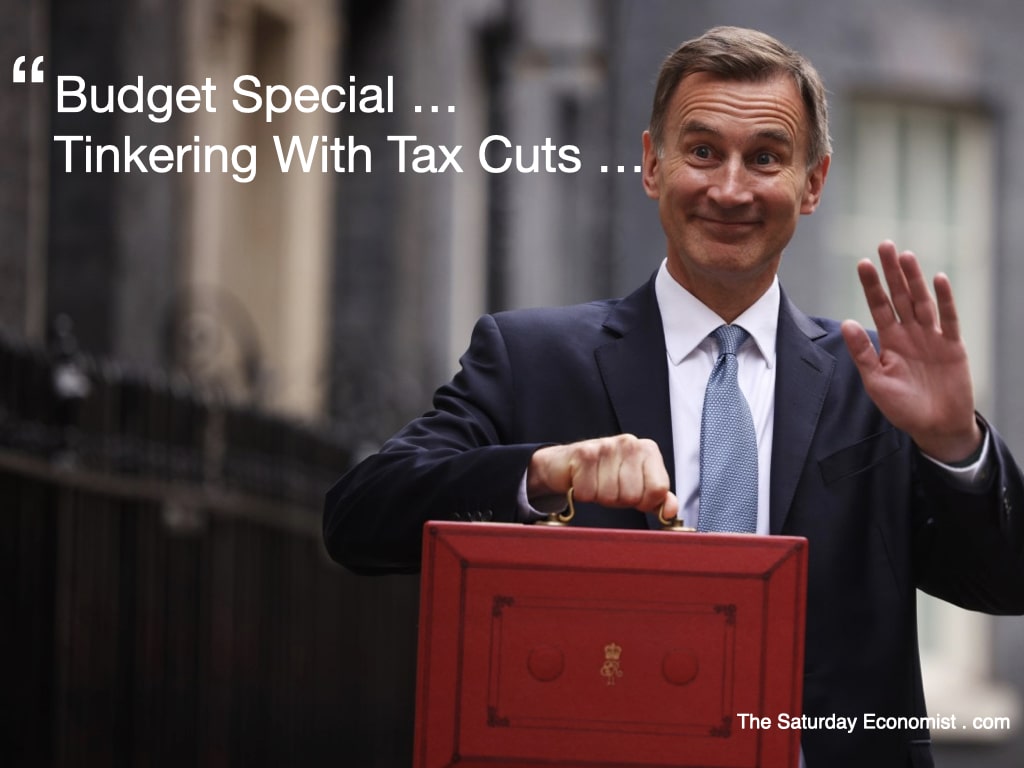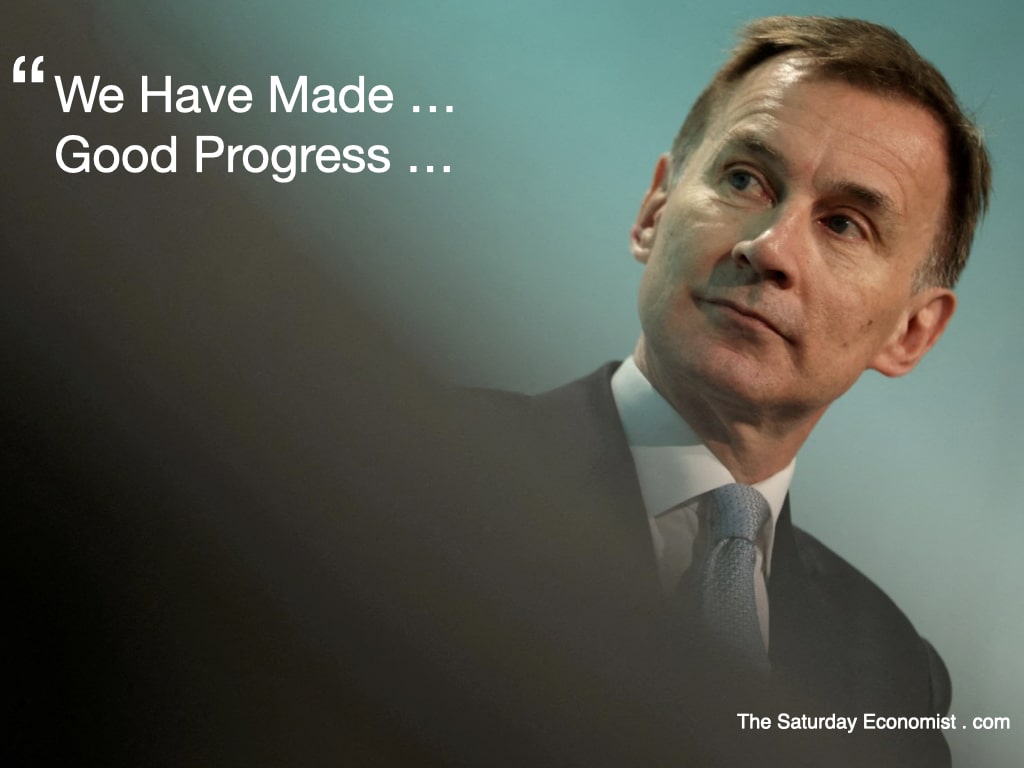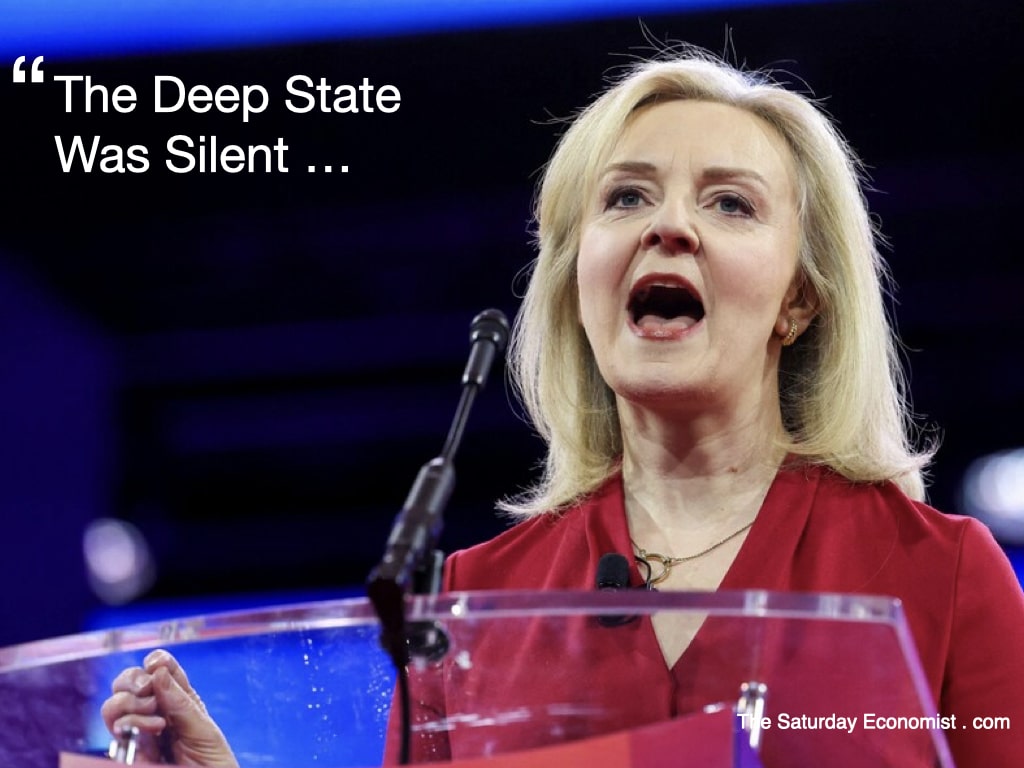|
Inflation Set To Fall ... Interest Rates Set To Follow ...
Bond yields rallied, Sterling slipped against the Dollar this week. The latest US inflation suggests CPI is heading higher. Analysts are beginning to rethink, the forward outlook for US interest rates and the actions of the Federal Reserve. It doesn't take much to spook markets. Uncle Sam's CPI inflation increased to 3.2 per cent in February from 3.1 per cent prior month. Producer prices increased to 1.6 per cent in February, up from 1 per cent in January and 0.8 per cent in November last year. Markets moved. Ten year bond yields increased to 4.31% in the U.S. and 4.10% in the U.K. Sterling slipped from $1.29 to $1.27. When it comes to understanding market moves, "Any explanation is better than none" (Nietzsche). In the U.K. We won't have to wait long for an update. The MPC is set to meet this week. A decision on UK rates due Thursday. The latest inflation data is due on Wednesday. This will give some steer to the direction of travel on prices and base rates. So what to expect? Market forecasts suggest consumer price inflation will have fallen from 4 per cent in January to 3.5 per cent last month. This, on the back of slowing food and energy prices. Core inflation, excluding food and energy, is expected to have eased from 5.1 per cent to around 4.5 per cent. Strong disinflationary pressures and tight monetary policy may cause inflation to fall below the 2 per cent target this year. The Office for Budget Responsibility produced new forecasts this month. They indicate inflation will hit the 2 per cent target in the second quarter and will stay below target for the rest of the year, ending the year at 1.4 per cent. The Bank of England forecasts suggest inflation will hit the 2 per cent target in the second quarter but inflation is expected to rise in the second half of 2024. Inflation will end the year a 2.8%, meeting the 2 per cent target only in 2025, the Bank said. Falling food prices and energy costs the critical drivers. Intervention of the Ofgem price caps of great assistance in April. The rosy coloured outlook for inflation may not be so easy to achieve. Oil prices Brent Crude averaged $83.48 dollars in February compared to $82.59 last year. Prices averaged $75 dollars in May and June 2023. The latest earnings data suggest whole economy earnings were 5.6 per cent in January (6.1 per cent excluding bonuses). Moving in the right direction but as yet incompatible with the 2 per cent target. Service sector inflation, accounting for almost half the index, increased to 6.5 per cent in January, up from 6.3% in November. So we await with interest, the February figures for inflation. Some steer on what happens next with Base Rates may then follow. Bank of England Interest Rate Decision ... There is little or no expectation the Bank of England will lower rates this week. Rates on hold the probable decision. The only excitement, the voting mix, "stick or twist". As David Smith writing in the Sunday Times this week points out ... "It is now more than seven months since the MPC last changed interest rates.. It would be a big surprise if there is not another hold this week. That does not mean that there will be no interest in Thursday's decision. Last month, one member of the committee, Swati Dhingra, voted to cut, while two members, Catherine Mann and Jonathan Haskel, voted to raise rates. The other six were happy to leave things unchanged. Some of the speculation this week is therefore, whether anybody else joins Dhingra in voting for a cut rates, which at this stage is considered unlikely, and whether Mann and Haskel throw in the towel on further rate rises." So when will there be a cut in rates? Following this week's meeting, the MPC will have five more meetings and five more opportunities to cut interest rates this year. Markets think May is too early. June is favoured for the first cut of 25 basis points. August, September, November and December are the remaining meetings scheduled this year. December too close to Christmas. November too close to an election, if he makes it that far! We anticipate base rates at 4.5 per cent by the end of the year. That would suggest rates cuts possible in August and September but not much more to follow in 2025 . In the UK, prior to the Great Financial Crash [2000 - 2008] the average inflation rate was 2.0%, the average UK bank rate was 4.50%. Ten year gilt yields averaged 4.50%, real GDP growth averaged 2.5%, earnings averaged 3.5%, the unemployment rate averaged 5%. As always, "'The Committee would be prepared to adjust the stance of monetary policy as appropriate if risks emerge that could impede the attainment of the Committee's goals." Oops, that's the Fed, not the Old Lady, talking.
0 Comments
It was budget day on Wednesday. No rabbit from the hat, no bounce for the dead cat. The Deep State was silent. The Chancellor of the Exchequer presented his Spring budget. It will be his last before the election. An election which could take place as early as May.
It's going to be great. We will be the creative capital of Europe, the next Hollywood, the next Silicon Valley. Not for the moment, the low tax, "Singapore of Europe" but we are still working on that. National Insurance will be abolished (but not anytime soon). We begin with a with an additional 2% cut, to an 8% rate, beginning in April this year. Full expensing of leased assets to be included for business tax relief. Capital gains tax for sales of second homes to be cut from 28% to 24%. We are on track to become the world's next Silicon Valley. We have become Europe's largest film and TV production centre. Studio space in the UK has doubled in the last three years. At the current rate of expansion, we will be second only to Hollywood by the end of 2025. We are providing more military support to Ukraine than nearly any other country. Our spending will rise to 2.5% of GDP as soon as economic conditions allow, or the Russians invade the Baltic states. Plans for leveling up continue, more money for Cambridge and Canary Wharf. AstraZeneca to invest £60m to expand their footprint on the Cambridge Biomedical Campus. Canary Wharf to be transformed into a new hub for life science companies. Problems in the hospitality sector identified. The freeze on alcohol duty will be extended to April 2025. The 75% business rates discount for pubs will continue. Fuel duty will be frozen for the thirteenth year in succession. The freeze means fuel duty will remain at 57.95p per litre, as it has since March 2011. The 'temporary' 5p cut on the fuel tax, first introduced in March 2022 by Chancellor Rishi Sunak, will remain in place until March 2025. The investment needed to modernise NHS systems so "they are as good as the best in the world" will be fully funded by central government. It will cost £3.4 billion and unlock £35 billion of savings, a ten fold payback assuming development costs can be kept under control and we don't use Huawei, Fujitsu or TikTok. "We will slash the 13 million hours lost by doctors and nurses every year to outdated IT systems. We will use AI to cut down and potentially cut in half, form filling by doctors. We will digitise operating theatre processes allowing the same number of consultants to do an extra 200,000 operations a year." We will also get rid of fax machines and use WhatsApp. We have made good progress ...
OBR forecasts show we have made good progress on the Prime Minister's three economic priorities. Inflation has halved ... Debt is falling ... Growth is 1.5 percentage points higher than predicted. The OBR expects the economy to grow by 0.8% this year and 1.9% next year. After that growth rises to 2%, 1.8%, and 1.7% in 2028. Inflation will fall to 2%. Underlying debt, will be 91.7% of GDP in 2024-25, then 92.8%, 93.2%, 93.2% before falling to 92.9% in 2028-29 with final year headroom of £8.9bn. (That's enough for another NI cut!) Business confidence is returning ... Business confidence is returning. Investment is surging. In the short period since the Autumn Statement, Nissan have announced they will build two new electric car models in the UK. Microsoft and Google have announced data centres worth over £3 billion. Thanks to the Business Secretary, the Global Investment Summit unlocked £30 billion of investment. There will be more money for police technology ... There will be more money for police technology. We will spend £230m rolling out time saving technology which speeds up police response times. Victims will be able to report crimes by video call (assuming their phones haven't been nicked). Drones will be used as first responders, under a new "Use Your Phone or Talk To A Drone" campaign. This way, all incidents will be attended with a "Fly By" at least. The crime response stats will be improved at the "flick of a joystick". Non Dom status will be abolished ... Non Dom status will be abolished raising £2.7 billion a year but there's a catch ... From April 2025, new arrivals to the UK will not be required to pay any tax on foreign income for their first four years of UK residency. This is a more generous regime than at present and one of the most attractive offers in Europe. But after four years, those who continue to live in the UK will pay the same tax as other UK residents. In a two-year period, individuals will be encouraged to bring wealth, earned overseas, to the UK where it can be spent, invested and taxed! This measure will attract £15 billion of foreign income and generate more than £1 billion in extra tax, it is said. Yes they will be arriving by the boat load, who could resist that offer. Overall, abolishing non-dom status will raise £2.7 billion a year by the end of the forecast period. That's assuming "they stay to pay". There aren't many, anyway, approximately 37,000, of which 90% choose to leave with seven years as it is. If they come and leave within four years, they will be better off under the new regime. It's a four year window. Time to work things out and time to buy a second home in Monaco. Village Hall Boost ... More good news, there will be £5m to renovate hundreds of local village halls across England so they can remain at the heart of their communities, hosting food banks and social services as local authority budgets are slashed. Liz Truss complained, when ditched as Prime Minster, she had been "downed by the deep state". The Bank of England, the Office for Budget Responsibility, the International Monetary Fund, the Economist and the Financial Times were all, she claimed, part of the Deep State. A sinister left-wing cabal promoting something called "wokeonomics" and an anti growth agenda.
"We have to understand how deep the vested interests of the establishment are, how hard they will fight and how unfairly they will fight in order to get their way". "That is what I learnt from my time as a government minister and my time in No 10." [Obviously a quick learner.] This time, this budget, the deep state was silent. Or was it? According to Tom Peck in the Times on Friday, maybe the Institute of Fiscal Studies should be added to the Deep State Hit List. "The IFS post-budget briefing is where budgets traditionally go to die". Director, Paul Johnson, the Wonk King, stands up in front of the assembled wonks and nobly fulfills his role of national, post-budget, extractor fan. The smoke is sucked away. The mirrors smashed." Reality revealed. "Nothing that Jeremy Hunt did yesterday, changed anything," Paul Johnson said on Thursday "We are still heading for a parliament in which living standards will be worse at the start than at the end. That's pretty much unprecedented." Tax revenues are seen to rise to the highest level, as a share GDP, since 1948. Pensioners will be punished by the latest budget moves. Risks to borrowing from certain tax cuts now, are to be paid for by back loaded uncertain increases in the future. Spending plans are largely unspecified. Richard Hughes Director at the OBR has called Government spending plans a " work of fiction". "Some people call [the projections] a work of fiction, but that is probably being generous. At least someone has bothered to write a work of fiction, the government hasn't even bothered to write down what the departmental spending plans are", he said. The IFS claims, there would need to be at least £20 billion of spending cuts, for departments other than the ring fenced departments of, health, defence, education and child care. Where would they come from? This, will be a "staggeringly hard choice". "How do you make cuts, given NHS waiting lists, local authorities at or near bankruptcy, backlogs in the justice system, long-term cuts to university funding and struggles in social care and prison systems". The £20 billion plus savings from productivity improvements are ambitious. The inclusion of £5 billion revenue annually for energy hikes in the future, flies in the face of history. How do you make cuts? The answer is, you don't or can't. The staggeringly hard choice will almost certainly be somebody else's problem, given the next spending review will take place rather conveniently, after the next election. Some agree with Professor Philip Cowley and have signed up to his Campaign to Scrap the Budget. "Such occasions of parliamentary theatre, give governments an incentive to put short-term gimmicks above serious policy development". Short term gimmicks? Never! Yep, tough choices to be made but after the next election. It could be sooner than you think ... |
The Saturday EconomistAuthorJohn Ashcroft publishes the Saturday Economist. Join the mailing list for updates on the UK and World Economy. Archives
July 2024
Categories
All
|
| The Saturday Economist |
The material is based upon information which we consider to be reliable but we do not represent that it is accurate or complete and it should not be relied upon as such. We accept no liability for errors, or omissions of opinion or fact. In particular, no reliance should be placed on the comments on trends in financial markets. The presentation should not be construed as the giving of investment advice.
|
The Saturday Economist, weekly updates on the UK economy.
Sign Up Now! Stay Up To Date! | Privacy Policy | Terms and Conditions | |




 RSS Feed
RSS Feed